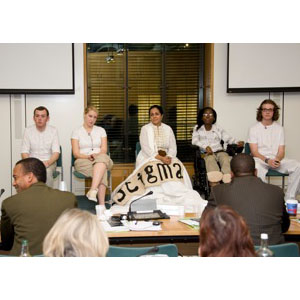On the1st December 2011 State of the Nation (Theatre Royal Stratford East), who are one of People’s Palace Projects Cultural Warriors groups, performed at the Houses of Parliament for elected representatives, officials of the Commonwealth, Parliamentarians Association and UN AIDS Ambassador Annie Lennox OBE.
State of the Nation’s performance, which used real testimony gathered by the company, sought to explore the issues of stigma associated with living with HIV and AIDS, and hoped to raise awareness about the condition. Their piece was framed around the weaving of the word “STIGMA” onto a large memorial quilt, symbolic of the ‘Names’ project AIDS memorial quilt created in America in the late 1980’s. The style of delivery was created by State of the Nation and is known as ‘Inter-acting, a blend of live verbatim ‘voices’ interspersed between open discussion by the audience, or inter-actors’.
Cultural Warrior Myriam Moustakim described her experience:
“It was at that moment that I realised that Stigma was a piece of theatre that engaged everyone in the room, although the delegates spoke many different languages [and] came from diverse cultures. People will always have their own opinion with regards to the take on the subjects that State of The Nation deals with – all of the pieces get people talking.”
The response to Stigma was overwhelmingly positive, with one delegate remarking that: “It seems to me that your group likes to talk about things that are swept under the carpet and that’s good.” Positive East, one of the organisations which contributed to the groups’ research, invited the State of the Nation to perform Stigma to their workers and service users, many of whom live with HIV.
For Sylvan Baker the performance project was typical of the aspirations of the Cultural Warriors programme, which is a 3-year leadership and arts project designed to allow young people to use arts practice to make a positive contribution to their communities.
“I felt the project not only allowed elected officials from approximately 40% of the worlds democracies to see what young people in the east end of London think and feel about the issues, it also allowed those young people access to the very corridors of power that make the major decisions on their lives.”
